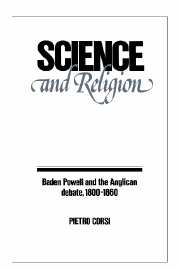Book contents
- Frontmatter
- Contents
- Preface
- List of abbreviations
- PART I
- PART II
- PART III
- The new synthesis and its developments
- 11 The methodology of science
- 12 The Christian apologetic and the fallacies of natural theology
- 13 Christian tolerance
- 14 The parting of the ways: Baden Powell versus Richard Whately
- PART IV
- Bibliography
- Index
12 - The Christian apologetic and the fallacies of natural theology
Published online by Cambridge University Press: 15 December 2009
- Frontmatter
- Contents
- Preface
- List of abbreviations
- PART I
- PART II
- PART III
- The new synthesis and its developments
- 11 The methodology of science
- 12 The Christian apologetic and the fallacies of natural theology
- 13 Christian tolerance
- 14 The parting of the ways: Baden Powell versus Richard Whately
- PART IV
- Bibliography
- Index
Summary
From the outset of his career Baden Powell insisted on the key role of science for the modern mind. The social and political events of the 1820s and early 1830s convinced him that science was bound to become the intellectual spearhead of social groups then attaining political and economic power. Baden Powell made this conviction explicit when he repeatedly warned the ‘higher classes’ of England that their role in society was increasingly being questioned on political and economic, as well as on scientific and intellectual grounds. He was also persuaded that the Anglican intelligentsia was unprepared and indeed unwilling to face the new challenges. The clergy fiercely resisted even moderate and indispensable reforms. The dons gathering around Newman and Pusey were also elaborating a theology designed, they hoped, to revive the fortunes of the Anglican Church by appealing to authority and tradition against the pride of the intellect.
It is important to emphasize that Oxford was not Britain, and that the scientific movement found within the ranks of the Anglican clergy many sincere friends and devoted supporters. Baden Powell was obviously influenced and embittered by his dealings with the ultra-conservative spirit in Oxford and by the struggle with the Tractarians. As can be easily perceived, the situation at Oxford headed the list of his concerns. He was a teacher in the university and a member of a group of intellectuals who aimed at making Oxford the leading cultural centre of the Anglican Church, and themselves the leaders of Oxford. It would however be wrong to interpret Baden Powell's 1838 synthesis of natural and divine truth as the mere product of Oxonian theological squabbles.
- Type
- Chapter
- Information
- Science and ReligionBaden Powell and the Anglican Debate, 1800–1860, pp. 178 - 193Publisher: Cambridge University PressPrint publication year: 1988

